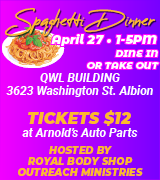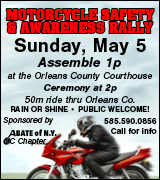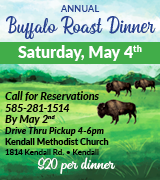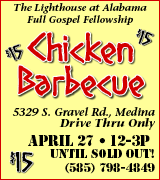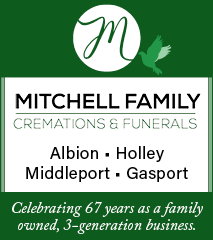Retiring Medina police chief says society has changed, demands increased on police officers in 3 decades
Jose Avila’s parents were in concentration camp in Cuba, fled to U.S. when he was 10

Photos by Tom Rivers – Jose Avila is pictured last week outside the Medina Police Department. Saturday is his last day on the job.
MEDINA – For the past 18 years, Jose Avila has served as chief of the Medina Police Department.
He has led the department through some high-profile cases, including when one of his officers, Lt. Mike Russell, was shot at a local pharmacy. Russell survived those gun shot wounds.
Avila, 53, grew up in Cuba and came to the United States when he was 10. He would settle in Rochester, where his father has been a long-time pastor. Avila joined the Coast Guard after high school, and first worked as a police officer in Nantucket, Mass. He would work at Holley, Rochester and Medina police departments.
There will be a retirement party today for Avila beginning at 1 p.m. at the Medina Theatre on Main Street. The community is welcome to attend.
The following interview was conducted last week at Avila’s office at the Medina Police Department.
Question: Where did you grow up?
Answer: I grew up in Rochester. My family came here on the Freedom Flights. In 1960s and ’70s this country would take so many people from the Communist Block countries. My parents applied for that when I was born in ’62, and they were both sent to jail when they did that. My dad served 10 years in a concentration camp. My mom, who was a school teacher in Cuba, she was stripped of all of her titles.
Q: That’s just for applying…
A: Just for applying for the Freedom Flights. That’s why it’s hard for me to swallow this whole thing with Cuba. It’s all a facade.
So my mom had to be picked up by a truck at 4 in the morning and then get dropped off at 9. She worked in a ricefield. She worked at a pig farm. In Cuba there is a tree and they make fiber things out of it. She worked with that and her fingers were full of it. My grandmother, my mom’s mother, lived with us and she basically raised me.
One day when I was 10 years old a police officer came to the house and told us. We were living with my father’s parents and they had applied for the Freedom Flights but didn’t get accepted because they didn’t have degrees. They ended up getting permission to leave from Spain. Sometimes you can leave and go right to the United States and sometimes you have to go through another country.
We didn’t have much in Cuba. We didn’t even have running water. We had an outhouse.
My grandfather, my dad’s father, refused to leave. My grandmother, my dad’s mother, went to Spain all by herself in her ’60s. From Spain she applied to come to the United States eventually. My dad had a brother who saw things going downhill in Cuba in 1959 and decided to come here. He created King’s Furniture up in Rochester. He built a business and that’s who eventually brought us all here. His finance and things like that.
The police officer came to the house and said you have an hour to leave this property and report to this particular airport. We showed up there and my dad was brought by a truck because he was in jail. He was in a concentration camp. We stayed at this airport for about a week.
There was one couch, 50 families and we were eating moldy cheese, whatever we could find. They would bring you in and interrogate you. Everyday the DC3 airplane would land. They would pick several families to leave. It was a big joke. They were trying to play with our heads. So four or five families would leave, the plane would land, and then “Nope, nobody’s leaving today.” The plane would have to take off again. It was a big game. Finally our turn came up about a week later and they let us go.
We got to the airplane and I never had Coke before or any type of soda. A man in very broken Spanish came out and said, “Welcome, you are now headed for freedom.” He offered us Coke and Root Beer. I never had either because I was in Cuba. I took the Coke and I don’t know what happened to me. I ended up passing out. When I woke up I was in a stretcher. It was in Miami. To this day I cannot smell Root Beer. It makes me sick.
From Miami, my uncle who lives in Rochester brought us here. My father went to work for Xerox. He was a minister and he opened a church. He still is the minister there (The First Spanish Baptist Church of Rochester). If you go there you will see his name on the front of the building: Efrain Avila, right on the corner of Dewey and Ridgeway next to the big Fire Department there. It’s a big church. He was very rare in Cuba to be a Spanish Baptist. There were very limited Baptists in Cuba and that didn’t help the situation.
He still preaches and is running the church. He has been there 30-plus years.
Q: Did you go to school in Rochester?
A: I graduated from Eastridge and always wanted to serve in the military. I had a chance to take the Coast Guard test and got into the Coast Guard. I did a lot of traveling. I was the only bilingual Coastie on the East Coast. They had two but one broke his foot. So I was it. They shipped me all over the place.
In 1981 George Bush, the first one, had a drug task force and I was involved in all that because I was the only bilingual guy. I spent most of my tour down in the Caribbean on ships and listening to radios. The druggies found out if they took off from Columbia and headed way, way out into the Atlantic Ocean, the Coast Guard ships that hung around – you know Cuba has two passages. Between Cuba and Haiti that’s called the Windward Passage. Between Cuba and the Yucatan Peninsula that’s called the Yucatan Passage. That’s the only way to make it to Miami other than if you go round the islands and that’s a month trip versus a couple weeks or a week.
So the druggies figured if they go out, no Coasties out there. Well, we learned it, and the Coast Guard had me listening. They would get on ham radio frequencies, which are very well controlled by the FCC. They would use CB lingo and I was taught the difference. My job was to find these guys, translate it, and then get an FCC fix on them. Then the Coast Guard ships would go out there and get them. It was called Operation Gossip. I was very much a part of that.
When I got out of the Coast Guard, I had already been working part-time for the Nantucket Police Department, the chief said I want to hire you full time. After serving a couple years over there, I decided to come home.
Q: Why did you want to come home?
A: There is a different format hiring over there than here in New York State. I went looking for a job. I took the City of Rochester Police Department, I took Orleans County, and Holley. That’s how I got started in Holley. I was in Holley for several years. I used to come out here (Medina) and translate for the court here.
Homer Phillips (former police chief) would call me when there was a case. I would never ask for money, I would just come out. As a matter of fact, I don’t think I’ve ever been paid for translating. I felt it was something I should share.
So I would translate here, and when the opening came, the chief called me and said, ‘We’d like to hire you.’

Medina Police Chief Jose Avila directs traffic while a costumed crowd crosses the street during Beggar’s Night in downtown Medina in October 2014.
Q: Did you start at Holley as a part-timer?
A: No it was full-time.
Q: I’m guessing you’ve always been a friendly person?
A: I don’t know about a friendly person, I can get mean when I have to or I can be strict when I have to. I’ve always felt I have to be firm when I have to, but a major part of law enforcement is serving the public. Serving the public doesn’t mean you have to be a mean person.
I’ve generally found out if you treat people with dignity and respect, they will treat you back with dignity and respect. There’s an exception to that, and you can always switch that button and become tough.
I always believed whether you are the victim of a crime or a serious murderer, the Constitution requires that we treat people with respect and that’s how I’ve always done it. The Constitution is a very important document that we live under and it needs to be upheld.
Q: You were in Holley for five years?
A: Yeah, and then 24 ½ years here. I started in 1992 and served a little time in the Drug Task Force in ’96, but I was still attached to the Medina Police Department. I was their representative on the Drug Task Force.
In ’97 I came back here and was appointed assistant chief. Chief (Don) Draper decided to retire at that time and I was appointed chief. I never actually put in for the chief’s position. I wanted to be the assistant chief because I wanted to help the chief.
I was called upstairs one day when Chief Draper said he was going to retire. I truly enjoyed working for him. I thought he was a great guy. It was an honor to be his assistant, to be there and to help him. The assistant chief is there to help, to defend the chief and make sure his policies are carried through.
I knew the chief was going to retire but I didn’t think it was my place to stick my two cents as to who was going to be the chief. If they brought someone in, I was fine with working for someone else. They called me upstairs – it was December 1997 because I’ll never forget it – and they told me if I wanted the job it was mine. I took it.
Q: Who was the mayor then?
A: It was Herb Brant. He was a very nice man. I have truly enjoyed working for all of the mayors. I’ve worked for Herb Brant, Don Kennedy, Howard Lake, Adam Tabelski, Clayton Ehrenreich and Andrew Meier. I’ve worked under six mayors and I’ve enjoyed every one of them.
Q: You’re positive about working here.
A: It’s been an honor. We didn’t have much in Cuba. We didn’t even have running water. We had an outhouse. We didn’t have much of anything so to me this is big.
Q: I’ve noticed with some of the tough budgets in Medina, you’ve accepted it and found a way to make it work without a lot of grumbling.
A: That’s the trick. I always felt it was my job to protect Medina but I had the people’s money in my hands, and I have a responsibility to try to do it as cheaply as I possibly could. Public safety, you can not play with that. It’s very important, especially in today’s day and age. But you also need to think about the taxes and the citizens who work hard everyday to pay those taxes.
Although I do believe when people come collectively like our village did, and pool their money like our village did, a house assessed for $50,000 is only paying about $1,000 a year in taxes. That’s not a bad deal they’re getting when the money is pooled. But it is still money they are paying. As a police chief I need to keep that in mind and I have.
If they gave me 5, I did it with 5. If they gave me 10, I did it with 10. I tried to do it with what they gave me.
Q: Is the department smaller now than when you started?
A: When I started there were 11 officers with Homer. Later on, due to a grant, we hired two more, 12 and 13. When I became the chief, it was brought down to 12, but the 12th position was never replaced. So we went down to 11 and we are at 10 right now. I’ve never gone up, we’ve always gone down due to the rising taxes. We’ve lost two positions since I’ve been chief.
Q: I know you have one clerk, did you have more support back then as well?
A: No, a couple of years ago they didn’t have the money to fund the animal control and I volunteered to take that on. I’m grateful I’ve had the chance to work with the county animal control officer. She has been very helpful.
Q: Are things worse now than 20-30 years ago in terms of crime in the community?
A: I think society has less respect for law enforcement and laws. I think with overcrowding in the jail the criminals are let out sooner. The criminals seem to go back to the same cycle. So I think society has changed as whole for the worse.
However, there are still a lot of good people out there, and they deserve our very best. That’s why we do it everyday.
It is a very thin blue line and I don’t think society appreciates how difficult law enforcement has become.
I always hear in this country about the thin blue line that protects a community. There truly is a thin blue line. There really aren’t many of us (police officers) when you think about it. It’s a tough job.
If you look at what a penal law looks like, the book is thick with vehicle and traffic. We have seconds, if we’re lucky minutes, to put a case together, and attorneys have weeks and months to pick it apart.
It’s very difficult because you could be on the midnight shift and have a fight call and have to arrest two or three people and have them there screaming in your cell. Imagine trying to interview somebody when somebody is outside there yelling, calling you names and spitting on you.
That happens all of the time, and you have to keep an eye on that person because you have to make sure that person doesn’t commit suicide, or hurt themselves and hurt somebody else. You have to get all of that paperwork, legal documents that are going to be reviewed by an attorney. In the meantime, there are other calls coming in. There are other fights in other places. You have to figure out how you’re going to handle that.
You also have to take that person to a judge. You have to call the judge and have them come out and arraign them, and then transport that guy to the county jail. That’s an awful lot for a human being to handle.
It is a very thin blue line and I don’t think society appreciates how difficult law enforcement has become.
When I first started with the police, the patrol car had a little gumbo on top, and one toggle switch to turn the lights on. There were two switches, one for the lights and one for the siren. Nowadays that officer has a laptop. It’s unbelievable all the technology.

Medina Police Chief Jose Avila served as honorary grand marshal for the parade. He is retiring next month after 17 years as leader of the Medina Police Department.
Q: It does seem like a lot to juggle.
A: It’s a lot of pressure on the officer on the beat. When you care about police officers and your community, it’s an awful lot for one person to have on their shoulders.
There hasn’t been a day or a night since I’ve been chief that I don’t think about the guy who is out on patrol. If something happens, I take it personal. I take a responsibility to try to do whatever it takes. I’ve done multiple things to try to solve a case. You get an individual charged with a crime, they have often been through the system. They know Miranda Rights and the rights that they have. To get a confession from them and to gather the evidence is not an easy task.
None of the cases would be solved without the officers here. The officers, our secretary and I we make it happen for as little as possible.
Q: Is it harder to be an officer in Medina compared to let’s say Rochester?
A: In Rochester, you may be doing as many as 30 to 40 calls per shift. Here in Medina, we may be doing 10 to 20 at the most. But down there that is all you do. Here you have to be a supervisor. When you get a crime scene, you can’t call the crime scene technician because you are the crime scene technician. You have to do the whole thing.
You go to a domestic in Rochester, and there is a civilian team out there that is on patrol and only handles domestics. You call ’em, and if a crime has not been committed and they just need counseling, you call that unit and you’re done. The officers leave.
Here in Medina, we are the counselors. We have to figure out how we’re going to prevent this from happening again. There is a lot more that a police officer in a small town does.
The police chief is not only the chief, he is a patrolman, he is a janitor, he works on cars, you do whatever it takes to keep this ship moving, to keep the people of Medina safe and to support my officers.
Q: So why did you stay and not go to Rochester or somewhere else?
A: I was in Rochester. I did a little time there. I like the small-town community here. It’s Mayberry. I didn’t like the mass-production law enforcement. In Rochester you were going to calls all of the time. I wanted a little more hometown feeling. I came to Orleans County in 1987 and I fell in love with the place.
Q: When did you work in Rochester?
A: I worked there between when I worked at Holley and here (Medina) for a little less than a year. After I got a taste of that and I had a chance to come back, I decided to come back. And I’m glad I did. I like the way things are in a small town. I like how it works.
In Rochester I found it to be mass production. Just get it done, get it reported and move on to the next call. You have to do it the way or else you’d get very far behind. Here you get a chance to really jump into the case and work with people.
Q: I notice on many of the calls you’re right in the thick of it.
A: I said to the board in December of 1997 that I’ll take the job but I’m not going to stop being a police officer because that is what I love. Everyday I try to do two or three hours of patrol. That is the bread and butter of a small town police department, the guys on patrol.
If you have a uniformed patrol car out there, a marked unit, that may get somebody who is going to do something to somebody, a criminal who is going to commit a crime, that gets that person to think twice. That’s why it is important that the police car is on patrol. They may think twice and the crime may never be committed. That’s Police 101.
Q: Your last day is when?
A: My last official day is Dec. 26. That’s Saturday. Then I hand over the keys to Chief (Chad) Kenward. I leave the department in good hands. I’m honored to have worked with so many fine officers.
I’ve had some sad times here: The Mike Russell shooting (Sept. 4, 2001). But we handled it. I’m glad that he’s still alive. He was the lieutenant here. It was a tough time for the department and it was my job to see it through.
I’m very grateful I’ve had good employees to help me see it through.
Q: I notice you keep a picture of Mike Russell on your wall.
A: He was shot at 3:05 p.m. on Sept. 4. Then 9-11 happened the following week. In between that, what the public didn’t know, we had a threat to the village. It was solved. The guy was from Rochester. He was a mental health patient and he sent us a letter saying he was going to blow us all up.
It was a lot for a small town police department to handle, but we handled it.
Mike was a hard worker. It was a sad day for all of us when that occurred. I’m glad that he’s still around. I promoted him lieutenant. He was a man with a lot of potential.
Q: What would make the job easier for you and the other officers? More money and more officers?
A: More money is always great and more people will always work, but if I could ask one thing from the citizens is understanding how difficult the job is for the officers that are here – the state troopers, the Orleans County Sheriff’s Department, my officers at the Medina Police Department.
Television makes it look very easy. The first 15 minutes of a show a crime is committed, a handsome police officer with lots of hair in a suit solves it by the half hour. By quarter of, in the hour show, the criminal is sentenced to life imprisonment for a minor misdemeanor.
It does not work that way, especially for a small-town police department like us, and Albion, and Holley, where the officers have to be answering calls, and handling crime and investigating cases and dealing with the phone. There is a lot going on. If you were God and I had one choice it would be for the citizens to understand the difficulty of the job.
If I have one request it is to understand the difficulty the patrolman on the beat has and be sympathetic to that officer.
Sometimes police officers make a mistake. One time a politician came in my office and he was upset about something. I said to him, there were a hundred things I had to take care of today and I’m sorry I messed up on No. 61.
Q: Is it hard to get momentum to finish a case when you’re called elsewhere?
A: Officers sometimes have to work overtime to fill the shifts. At the end of the day, that’s not their end of the day. They have subpoenas. They could be working the midnight shift. Imagine working 11 p.m. to 7 a.m. and then having to show up at court at 9 a.m. for an all-day trial and then having to come back for a midnight shift. How awake is that officer going to be? And he has to do it. He has no choice. And he has sit on the stand and testify to something that happened six months ago or maybe a year ago, and he better be right.
If I have one request it is to understand the difficulty the patrolman on the beat has and be sympathetic to that officer.
Now we have terrorism to worry about. I’ve been fighting drugs since I was 18 years old. It’s still there. The drug epidemic has not gone away.
We’ve had good years. For a while heroin went away, now it’s back. There’s always marijuana and cocaine. It’s an epidemic that in my opinion puts our society down. I’ve seen the end results of drug usage. I’ve seen good people on drugs lose their families. It’s very said. Kids suffer.
Believe it or not it weighs heavily on police officers. I’ve seen a lot of guys come back from calls and cry in that backroom.

Jose Avila is pictured inside his office at the Medina Police Department.
Q: Maybe it’s harder in a small town because you get to know the families?
A: That’s one of the problems. There are benefits to having the police chief live in the community where you police. I can’t tell you how many cases I’ve handled out on my back porch. People who choose to come to my house while my wife and I are having dinner. God bless her. Lisa has been a very understanding person. I’m a lucky man to have her.
But I’ve handled hundreds of calls on my back porch. I’ve had them on my front porch, knocking on the door at 1 in the morning. You go out and you have to handle it. These people pay your salary and you can’t say no to them.
One of the first things I did when I became chief is I threw away the appointment book. I told my secretary anybody who walks into the front door has the right to see me. It is my job to try to help them in any way that I can.
Q: I’m surprised you’ve been able to do this as chief for almost 20 years.
A: I’ve been able to do it because I have good officers and they help me to do it. It’s a collective effort with my secretary Theresa (Caldwell), who is very, very efficient and the officers who have worked with me over the years. I’ve been lucky.
It was an honor to have worked with the New York State Police and the Orleans County Sheriff’s Office. They have been wonderful to me. They were always accommodating to me when I needed the extra help.
Q: What will you do when you retire?
A: That’s a good question. I’m not really sure. I’m going to spend some time helping my parents because they deserve it. They suffered a lot in Cuba to get me here. I want to make sure the remaining time they have is as comfortable as they can be.
My father suffers from a lung disease. They made him spray pesticides in Cuba when he was in the concentration camp without a respirator and that hardened the fibers in his lungs. It’s starting to take effect on him.
I’m going to spend some time with my wife Lisa and my son. I actually have two sons and two daughters. I have three kids from a previous marriage. I want to spend time with them.
I also going to try to serve, I’m not sure where. But wherever I live I’ll find something because I enjoy it. Service to the community you can never do enough. I’ll find something where I’m needed and I’ll serve. It could be a translator, cleaning toilets, cleaning the floor.
I’m not sure I’m always going to be able to stay away from police work because I love it so much. It’s been a part of my life for 32 years.
I’m going to miss this. It’s painful because I don’t want to leave it. If I care about the department I have to leave. Somebody new, somebody younger needs to take over.














